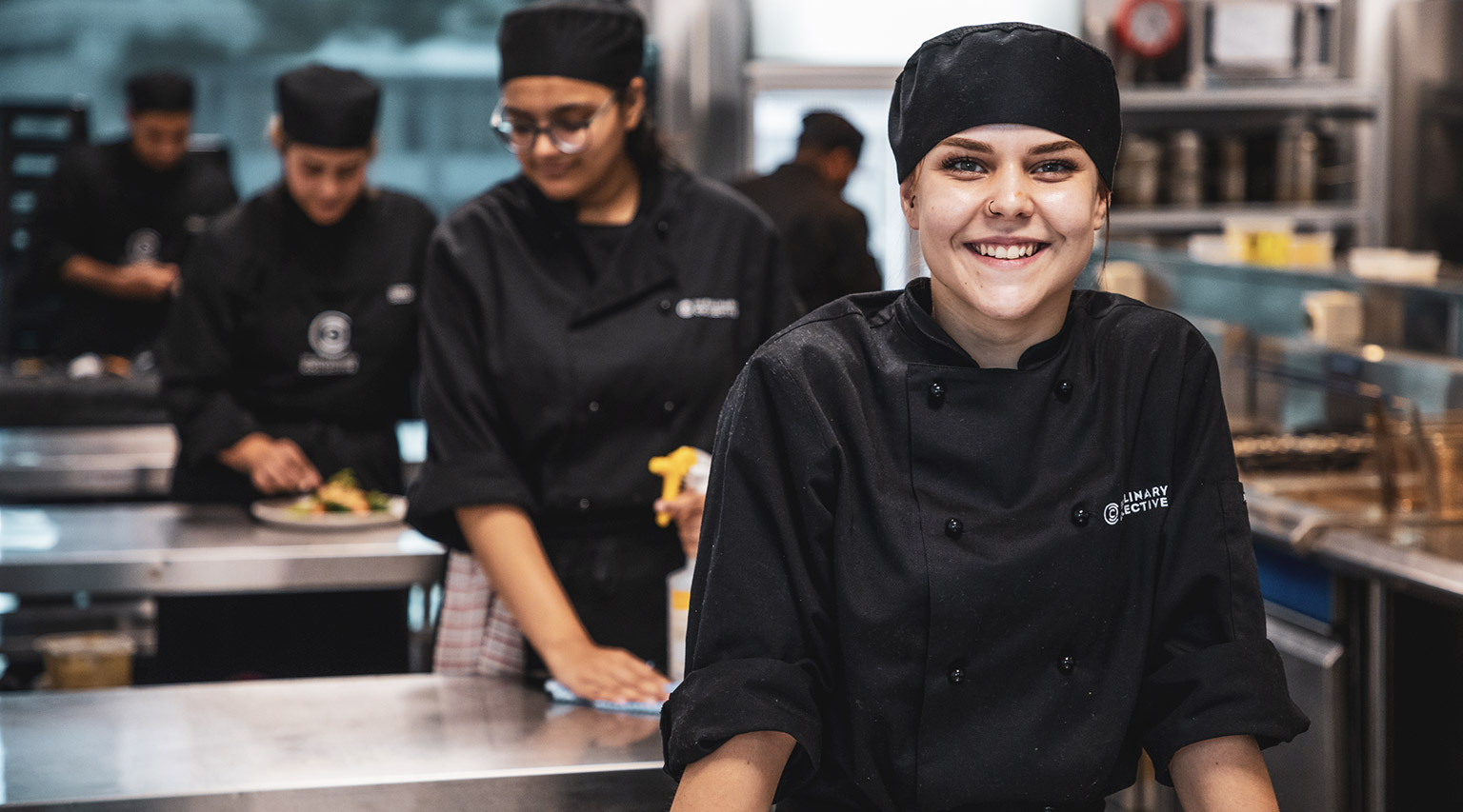
Cooking is all about people. Food is maybe the only universal thing that really has the power to bring everyone together. No matter what culture, everywhere around the world, people get together to eat.Guy Fieri, restaurateur and Emmy Award-winning television personality
Nau mai, haere mai!
Hello, Kia ora, Talofa, Kumusta, Malo’etau lava, Kia Orana.
Nĭ hăo, Fakalofa Atu, Namaste, Bula, Sata srī akāla, Marhaba.
Welcome to the exciting world of cookery! We hope you have a wonderful time studying with NZMA.
You’re here because of your passion for great food. Whether your goal is impressing your friends and whanau at the dinner table with your culinary creativity or taking your first exciting steps into a professional chef role, our goal is to ensure that you gain next level food preparation and cooking skills. Throughout this course, you will develop the knowledge and skills required to persue a career as a junior chef in the hospitality industry, and will gain an understanding of:
- The basics of professional cookery
- Asian-inspired cookery
- Classic European cookery
- The Kiwi kai experience
- Emerging food trends
- Working as a team to present restaurant-quality food
On completion of this course, you will have a strong foundation to commence work in the hospitality industry.
Module Overview
| Module Name | Assessment* | Learning Hours* |
|---|---|---|
| The Basics of Cookery | CKL3 01A1 | 100 |
| The Asian-Inspired Fusion | CKL3 02A1 | 100 |
| The European Flavour Experience | CKL3 03A1 | 100 |
| The Kiwi Experience | CKL3 04A1 | 100 |
| Emerging Food Trends | CKL3 05A1 | 100 |
| The Showcase | CKL3 06A1 | 100 |
How will you learn?
Learning hours are blended. This means that you will complete some on them on campus and some of them in your own time. There is no set class time for the online learning component of this course, and learning will take place at different times for students/ākonga enrolled in the programme. You are encouraged to interact with other students/ākonga through forums and group messaging. Keep in mind that not everyone likes to study when you do, so you may need to wait for a response.
Total learning hours are 600 hours. That is about 17 hours per week of part-time study, including self-directed learning.
The learning hours include:
- reading, watching, and completing the activities on the online campus
- completing assessments
- self-directed practicals
- practicals in the teaching kitchen
Teaching Kitchen Practicals
You will be spending 6 hours per week on campus in one of our purpose-built teaching kitchens. The teaching kitchens are designed according to commercial kitchen design principles and are equipped with commercial kitchen equipment.
As you will be working in a professional kitchen, there are certain standards you are expectated to meet to comply with professional standards of personal safety and hygiene.
You will be provided with a knife kit containing a selection of professional-level knives and utensils, which will come in a carry roll. You will also be provided with a Culinary Collective apron and black t-shirt to wear when in the kitchen. However, you will need to provide your own:
- Long pants (comfortable fit but not baggy) and made from a material which will withstand the rigours of a professional kitchen, e.g.cotton, polyester or a blend of these.
- Shoes with non-slip soles and enclosed toes. Shoes need to be comfortable yet afford protection against slippery floors and things being dropped!
- Head covering. If you have long hair it must be tied back. Disposable hair nets are available in all kitchens.
Assessments/Aromatawai
A total of 60 credits are awarded for the programme.
There are 6 assessments to complete, 1 for each of the 6 modules that make up this course. Assessments will be awarded an achieved or not-achieved result. All learning outcomes must be met to obtain an achieved result. All assessments must be completed in full, with all answers correct, for an achieved result.
Assessments are recorded as follows:
- Achieved – all work/unit has been achieved to the standards set in the assessment and performance criteria.
- Not Achieved – the student/ākonga has yet to complete the relevant work to be awarded the assessment or unit.
Assessment Submission
Studying at Level 3
Graduates of this qualification will be able to:
- Communicate effectively and behave in a professional manner with colleagues, managers and customers in a commercial kitchen.
- Deal with familiar problems in a commercial kitchen by following standard operating procedures.
- Prepare, cook and present a range of basic dishes by applying fundamental cookery skills employing commodities commonly used in industry.
A graduate of a level 3 certificate is able to:
- demonstrate some operational and theoretical knowledge in a field of work or study
- select from and apply a range of known solutions to familiar problems
- apply a range of standard processes relevant to the field of work or study
- apply a range of communication skills relevant to the role in the field of work or study
- apply literacy and numeracy skills relevant to the role in the field of work or study
- work under limited supervision
- demonstrate major responsibility for own learning and performance
- adapt own behaviour when interacting with others
- contribute to group performance
We’re here to help
If you're ever unsure about something or need assistance, please don't hesitate to contact your tutor. You can send them a message via email or via the 💬 messages feature on the top right corner of the online campus.